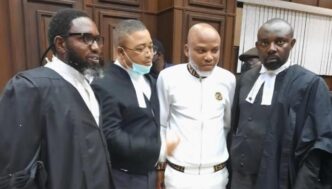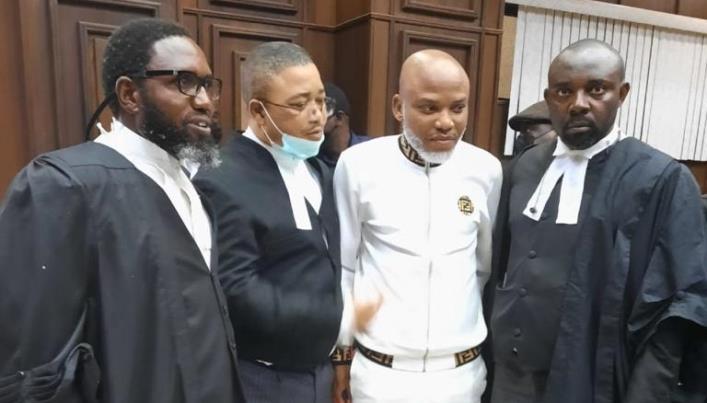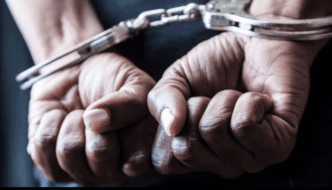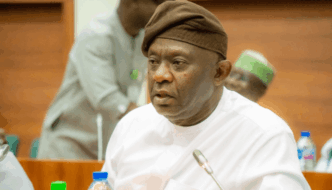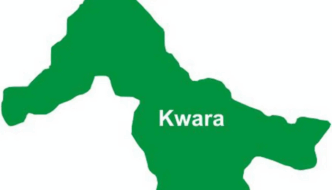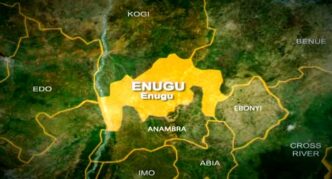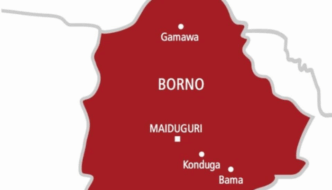The decade-long legal case involving the leader of the Indigenous People of Biafra (IPOB), Nnamdi Kanu, finally came to a climax on November 20 after the Federal High Court in Abuja convicted and sentenced him to life imprisonment.
Kanu was found guilty on all seven counts of terrorism-related charges.
The terrorism trial has attracted attention both within and outside the country in the last ten years. The judgment comes amid pressure and agitations from federal lawmakers and many concerned Nigerians for a political solution to the issue which would lead to Kanu’s release.
Last week, about 44 federal lawmakers wrote an appeal letter to President Bola Ahmed Tinubu to release the IPOB leader for the sake of peace and unity.
In the letter, the lawmakers urged the President to invoke his constitutional powers to release Kanu from detention and to convene an all-inclusive political roundtable involving all stakeholders to address the country’s challenges.
Read also: Opinions divided in South East over Nnamdi Kanu’s conviction
However, the verdict by Justice James Omotosho on November 20 just days after, marked the conclusion of a long-drawn legal saga that would continue to shape political discourse for a long time.
Kanu, who is also a British citizen, had previously been arraigned in Abuja and faced multiple trials before four different judges over the years.
The judges had stepped down from the case in controversial circumstances, with some refusing to be involved in the case, and Kanu expressing lack of confidence in their neutrality and telling them to back down.
Arrest and early legal battles
The IPOB leader was first arrested in October 2015 on charges bordering on treasonable felony, unlawful possession of firearms, and incitement.
Back then, Kanu’s arrest triggered widespread protests across the Southeast, with supporters describing him as a freedom fighter advocating for self-determination, while the Federal Government insisted he posed a security threat.
Though granted bail in 2017 on health grounds, Kanu later fled the country after a military operation in his hometown, an event that fueled both controversy and sympathy.
Rearrest in Kenya
In June 2021, Kanu was rearrested in a foreign country under still-disputed circumstances and brought back to Nigeria to face pending charges. His return ignited renewed protests and “sit-at-home” orders across the Southeast, intensifying insecurity and economic disruption in the region.
The Federal Government expanded his charges to include terrorism-related offences, citing his alleged involvement in radio broadcasts and online content that encouraged attacks on security formations.
Trial and legal arguments
Kanu’s legal team consistently argued that his extradition violated international protocols, insisting that he could not be tried until the government explained the circumstances of his return. They also maintained that the prosecution failed to link him directly to violent acts attributed to IPOB.
But the government countered that IPOB had been proscribed since 2017 and that its activities including broadcasts from Radio Biafra undermined Nigeria’s sovereignty and public safety.
Read also: Decade after arrest, court sentences Nnamdi Kanu to life imprisonment over terrorism
Conviction and sentencing
In a packed courtroom on November 20, Justice Omotosho delivered the verdict, finding Kanu guilty on all counts related to terrorism, incitement, and actions deemed threatening to national security. He was consequently sentenced to life imprisonment.
Omotosho also ordered that he be prevented from having access to mobile devices and broadcast equipment except under the watch of security operatives.
Omotosho, before the judgement, had dismissed Kanu’s contention that his extraordinary rendition from Kenya to Nigeria ultimately rendered his trial a nullity.
He held that although the extraordinary rendition from Kenya might have violated Kanu’s fundamental human rights, it did not invalidate his trial for offences committed as well as the court’s jurisdiction, citing similar cases in the US.
Earlier before the judgement, Kanu had reminded the court of the three different motions on notice he previously submitted, seeking, among others, a stay of further proceedings in his trial until the issues he raised were determined.
The IPOB leader had, in the motions, asked Omotosho to suspend the judgement, arguing that proceedings were conducted under a repealed and non-existent law.
Of the seven charges against Kanu, six of them were filed under the Terrorism Prevention Act 2013 which was amended in 2022.
The Biafra agitator claimed the seventh count which has to do with alleged illegal importation of a radio transmitter into Nigeria was ordered by the Supreme Court to be removed.
The IPOB leader’s motions also sought a halt of the judgement on the basis that the court lacked jurisdiction to try him and did not allegedly provide an opportunity for the IPOB leader to file a final written address in his defence.
He also asked the court to refer his case to the Court of Appeal to determine the issues he raised in the motions on notice.
In response, counsel to the Nigerian government, Adegboyega Awomolo, a Senior Advocate of Nigeria, asked the judge to dismiss the applications for lack of merit.
Omotosho, ruling on the motions, declared that the time for defence had passed and that Kanu’s motions had been decided before now.
Decision to sack his legal team ill-advised
Some observers said that the IPOB leader mishandled his chances by sacking his eminent legal team led by Kanu Agabi, SAN.
Malachy Ugwumadu, a legal practitioner and former president, Committee for the Defence of Human Rights (CDHR), said: “I sincerely believe that Mazi Nnamdi Kanu unwittingly played into the hands of the prosecution and left Justice James Omotoso with no other option than to convict him.”
Ugwumba also faulted Kanu’s insistence that the court lacked the jurisdiction to try him.
“The judge warned repeatedly that Kanu should open his defence, but he chose to raise motions. He also disbanded his legal team which has become his consultant. He provided no witness. He did not realise that he needed enough legal experts to handle a matter that carries weighty penalties. Perhaps, he may have concluded in his mind that he was going to be convicted,” he said.
Read also: Nnamdi Kanu moved to Sokoto prison after life sentence for terrorism
Judgment draws mixed reactions
The November 20 judgement has continued to draw mixed reactions among Nigerians especially, south easterners. While some people have called for caution and the need for federal government to adopt a political solution towards resolving the issue with Kanu, his supporters have flatly condemned his conviction.
Many of Kanu’s supporters say the ruling by Justice Omotosho was premeditated in the interest of the federal government and security agencies.
They stated that the manner the conviction was carried out in the last few years, made it obvious that the judgement would not be fair to Kanu.
Also, some analysts have warned that Kanu’s conviction could heighten the fragile peace in the South East, calling for a political solution to the issue.
They have also called upon governors of the South East states to unite and speak with one voice to lobby President Tinubu to find a political solution to the issue.
But government officials and its legal team have applauded the ruling, seeing the verdict as a win for national security and the rule of law, insisting that no individual is above the state.
Implications for security and politics
The fear among many Nigerians is that Kanu’s conviction could lead to renewed hostility, agitations and insecurity crisis in the Southeast Nigeria, especially at a time when peace is gradually returning to the region.
In recent months, the dreaded Monday sit-at-home was becoming a thing of the past, while armed groups’ attacks and other security concerns are gradually fading off in the region.
The fear is that considering that Kanu is seen as a symbol of resistance, anger over his sentencing could lead to renewed agitations leading to instability in that part of the country.
Shola Odiyile, political analyst, told BusinessDay that the ruling could either intensify calls for political negotiation or embolden a more hardline government stance.
Read also: Ohanaeze condemns life sentence on Nnamdi Kanu, calls for calm
The analyst feared for the worse, but called for dialogue by government at the centre and Southeast leaders.
Similarly, in recent years, human rights groups and CSOs in Nigeria and abroad have raised concerns about due process, urging federal authorities to address broader grievances driving regional agitation across Nigeria.
For now, Kanu’s legal team has already signalled plans to appeal the conviction.
Aloy Ejimakor, former special counsel to Kanu, told reporters after the judgement that the IPOB leader would appeal the ruling at the Court of Appeal.
Observers say the outcome of that appeal and case will determine whether the ruling stands and how it will affect the already fragile stability of the Southeast region.


